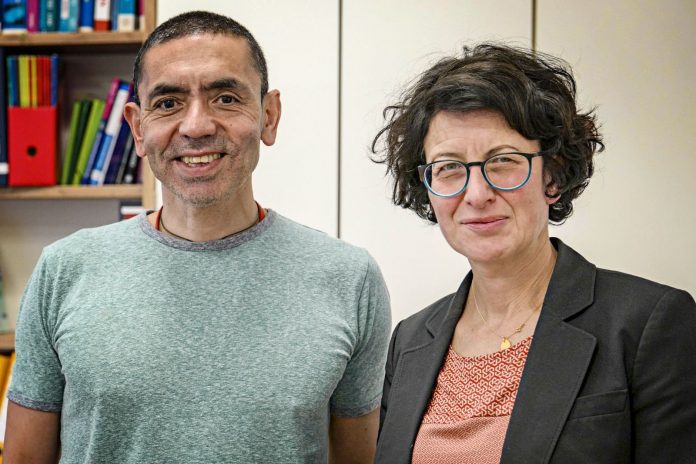Credit…Felix Schmitt/
When the German company BioNTech and Pfizer announced last month that they had very promising results for a vaccine against the coronavirus, my Twitter feed went wild.
Alongside the flood of congratulations and expressions of joy, there was cause for special jubilation: Ugur Sahin and Özlem Türeci, the couple who founded and run BioNTech, are Germans of Turkish descent. Their story promised to challenge the resentment against immigrants that over the past decade has become pervasive in German public life. If anything could unseat anti-migrant sentiment, surely a Turkish-German couple saving the world from a deadly virus would do it.
But nothing is so simple. In heralding the pair as an exceptional “migrant success story,” many unwittingly repeated the central tenets of anti-migrant thinking — that migrants are fundamentally apart from the rest of German society, that a special few may earn their place but the rest should be rejected. The dissonance was jarring, but perhaps not surprising. When it comes to immigration, Germany is uneasy even with its most spectacular successes.
Even so, the invention of a vaccine by a couple with Turkish names seemed to come at the right time. Ten years ago, in a book titled “Germany Abolishes Itself,” a formerly high-ranking Social Democrat, Thilo Sarrazin, claimed that the educational gap between immigrants from Muslim-majority countries and Germans was rooted in genetic differences (“intellectual deficits,” he called them). Immigration, Mr. Sarrazin warned, was threatening Germany’s economy by decreasing overall education standards. The book became a best seller and still sits on many middle-class bookshelves.
Alternative for Germany, the far-right party formed in 2013 that has exploited and intensified anti-migrant feeling, picked up on the narrative, stigmatizing immigrants as a dangerous drain on the nation’s resources. The party never stops pounding the drum. In 2018, for example, Alice Weidel, a co-leader of the party, called immigrants “Kopftuchmädchen” and “Messermänner” — head scarf girls and knife men — from the floor of Parliament. Political debate, in no small measure because of the party’s success, often focuses on the problems supposedly linked to immigration: religious zealotry, crime, poverty.
Against this backdrop, Mr. Sahin’s and Ms. Türeci’s success felt like a welcome opportunity to celebrate the benefits of immigration, to recognize how migrants enrich and deepen our society. Their stories — Mr. Sahin, the son of a Turkish laborer, came to Germany as a child while Ms. Türeci, the daughter of a Turkish doctor who moved from Istanbul, was born in Germany — brought to light the often hidden history of postwar immigration to Germany.
Starting in the 1950s, to fuel its postwar industrial boom, Germany recruited laborers mostly from Italy and Turkey. Called “Gastarbeiter” — “guest workers” — they were not meant to stay. But many did, and today their children and grandchildren are an integral part of the country’s society. Yet they are often overlooked. Championing in particular the success of Dr. Sahin, the son of a Ford factory worker, felt like a necessary corrective to such condescension.
But singling out works both ways: It can offer much-needed recognition, but it can also make immigrant success look like an exception and mark migrants out as “not one of us,” as a colleague of mine pointed out. When I called a few Germans of Turkish descent, many expressed a similar ambivalence.
“Finally, here was something we have missed for a long time: appreciation,” Hatice Akyün, a friend and a columnist for the newspaper Der Tagesspiegel (where I work), told me. As a fellow child of “guest workers,” she felt a connection to the couple — “a biographical pride, if you will.” But she was also uncomfortable with the focus on their biographies. “I’ve played the role of a poster child for successful integration myself for a long time,” she said. “But it can be tiring and frustrating to be seen through that lens all the time.”
who — in 1960 or 2020 — come to call the country home.
Sourced: The New York Times
Statements, comments or opinions published in this column are of those of the author(s) and do not necessarily reflect the editorial policy of Warsan magazine. Warsan reserves the right to moderate, publish or delete a post without prior consultation with the author(s). To publish your article or your advertisement contact our editorial team at: warsan54@gmail.com


